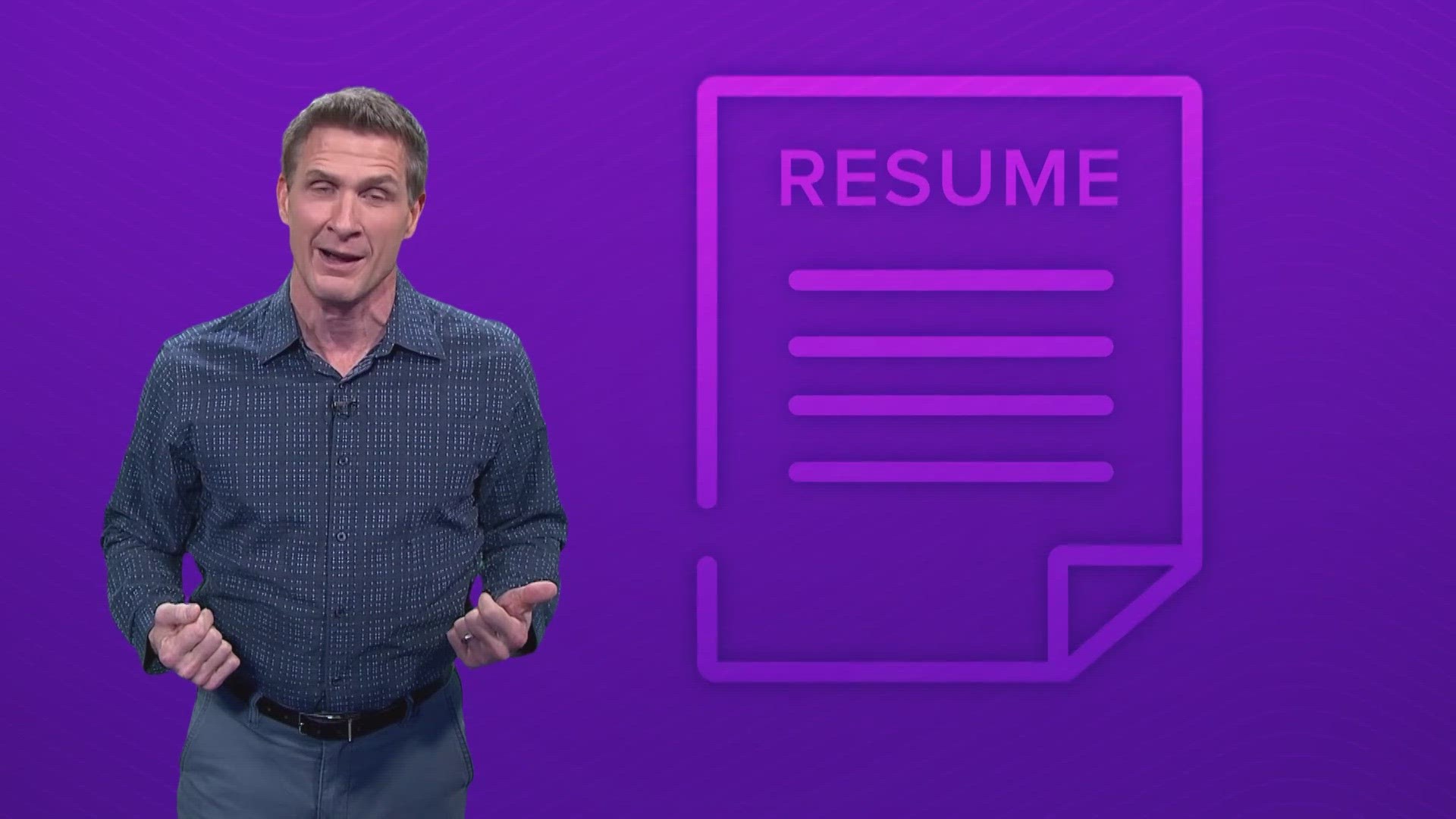DALLAS — During the pandemic jobs rebound, it seemed like if you had a pulse, you had a decent chance of filling one of the many millions of vacancies. That is a little bit of an exaggeration. But Robin Ryan, who has been called ‘America’s Top Career Expert’, says: It was flaming hot. In my career I’ve never seen it like that…ever.”
Most people are not very good resumé writing
The job market has cooled some since it peaked in the pandemic, but it is still relatively hot. And Ryan says a pulse is not enough—you also need to look good on paper and digitally. The problem is, “Most people are not very good at resumé writing.”
How can that be? Don’t you just list all the places you’ve worked and all the skills you have amassed over the years? Well, maybe not all.
“Put in what you've got to say. The longest resumé I’ve ever seen was 28 pages!” Ryan said.
That is impressively bad. Ryan says you should aim for an absolute maximum of two pages (and the paper version should be two separate pages, not front and back, she says). Ryan is certain that no one is reading 28 pages of your history.
“The initial glance is usually 15 to 20 seconds," she said.
Are you forgetting something very important on your resumé?
And that quick glance may be scanning for something you are not including.
“What I call a summary of qualifications," Ryan said. "It's very close to the top and it's four to six sentences of what you bring to the job. So, it summarizes your skills and experience.
Ryan says try to avoid writing that in first-person. She also says to use as many specifics and numbers there and throughout your resumé.
“Like, you supervise 20 people as opposed to ‘supervised team.' And you've handled a budget of X number of dollars and that sort of thing," she said.
And show your results.
“What were your actions and what were the results? Did you save money? Did you make money? Did you decrease or save time?” Ryan said.
Ryan has more to say about resumés and she offers 21 ways to improve your resumé here.
Paying attention to job descriptions
You also want to pay attention to the job description. Ryan cautions that if a great number of requirements or preferences are listed.
“They all don't matter the same," Ryan said. "Typically, the most important ones are first. Make sure you address those.”
And what percentage of those requirements or preferences should you have at a bare minimum to realistically apply for the position? Ryan says about 80%.
More advice on resumés
Regardless of how many of the qualifications you meet, she advises that you refrain from copying a lot of the keywords from the job posting and simply sprinkling them throughout your resumé.
“Biggest mistake," she said. "No results there. Got to have results!”
And when I asked Ryan whether people should follow the trend of adding a QR code to their resumé to direct a hiring manager to more of their work, she had a one-word answer that she repeated four times.
“No, no, no, no."
Beware the applicant tracking system
She also warns that one of the biggest errors people make is, “They ignore the ATS–the applicant tracking system.”
That is the automated program that scans and sorts resumés before a human ever sees them. What are workers doing wrong in terms of the ATS?
“They…make these very, very beautiful-looking, creative, colorful resumés that are never going to be seen because the system doesn't recognize it. So, if you're using colored ink or headers or footers or columns and tables, that system's not going to see them.”
It’s not just what you add into the document, Ryan says the program you use to create the document matters a lot as well.
“A lot of the tracking systems don't read a PDF correctly, so a Word file -– and let me make a caution: A lot of younger people have a Mac and so and they may not have Word. They may have something in the cloud. It needs to be a Word document. So, when you save it, you must save it as Microsoft Word.”
Ryan says get on LinkedIn and connect!
Also, Ryan says the resumé is not enough. She says if you are not on LinkedIn, you should know hiring managers are on there every day.
She advises that you get on there and connect with people…many of them, “The best network has 300 to 500 connections. It is not uncommon for me to see new grads come out or people…26 or younger (who have) maybe 50. Some have zero, some have three. This isn't going to help you. It's an algorithm, and it needs to be active.
She says the more connections and interactions you have on the platform, the more likely it is that you will be seen. It can also help some people to turn on the LinkedIn ‘Open to Work’ feature, which lets others know you’re interested, “I don't do that with higher level professionals, but…especially for people under 30, even under 35, it doesn't hurt”.
Ryan advises that your LinkedIn profile and your resumé should be regularly updated, “Once a year. And a couple months after you get a new job, you can, at least on LinkedIn, put down where you've been hired…and you know a broad sentence about what you're working on there."
Ryan offers 17 tips here for your LinkedIn profile and a free e-guide to your LinkedIn profile here.

